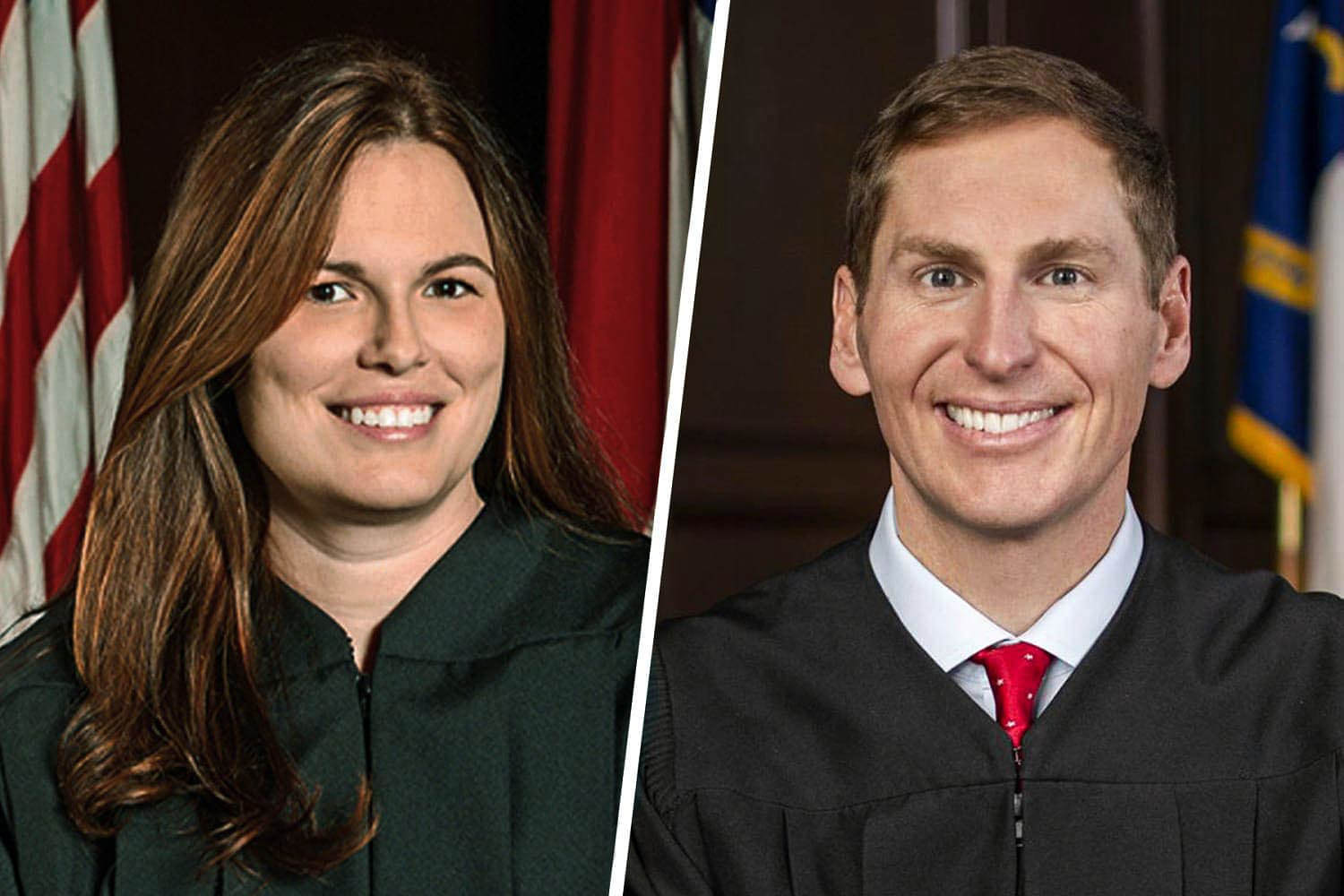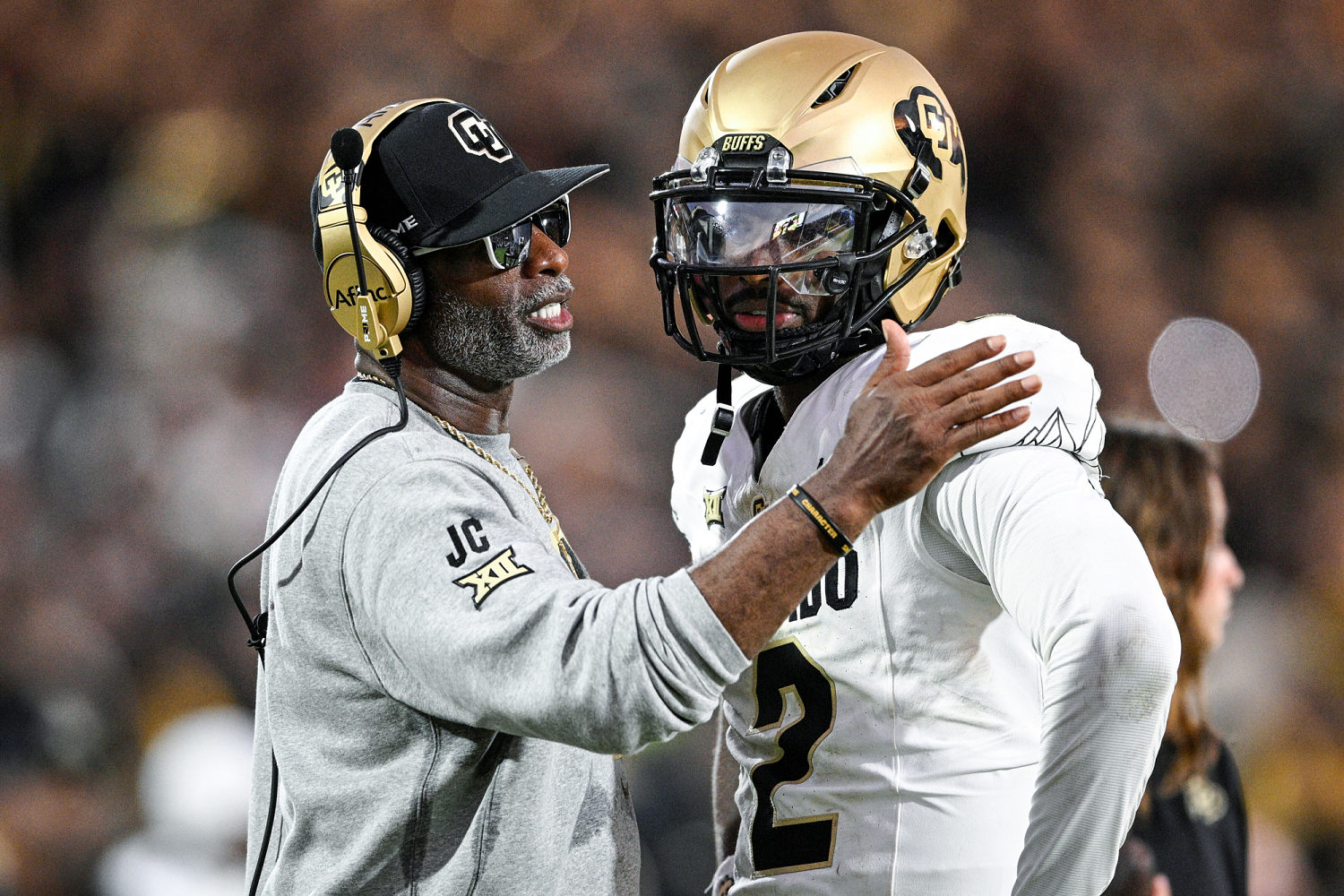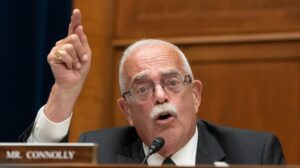The Dictatorship
Lost Cause ideology factors into this North Carolina judge’s refusal to admit defeat

Judge Jefferson Griffina Republican who lost his November race for the North Carolina Supreme Court, has created a scene by refusing to concede the race for five months, and recently a 2001 photo has surfaced of him wearing a Confederate uniform at a fraternity party when he was a student at the University of North Carolina. Griffin insists that the photo “does not represent the person I am today.” If it’s true that he no longer supports the Lost Cause, a mythology that glorifies the Confederates that attacked the Union, then he should also give up the lost cause of election subversion.
If it’s true that he no longer supports the Lost Cause, then he should also give up the lost cause of election subversion.
Incumbent Justice Allison Riggs, the Democrat in the race, won the election by 734 votes, but by challenging 65,000 ballots that were cast in November, Griffin continues to try to whittle down the electorate after the fact to tip the race in his favor. A Friday ruling by a three-judge panel on the Republican-controlled appeals court — on which Griffin, who recused himself, sits — ruled in Griffin’s favor. The panel decided 2-1 that the 65,000 voters whose eligibility Griffin challenges should have 15 business days to prove they were eligible to vote.
But the North Carolina Supreme Court intervened Monday with a stay against the appeals court ruling. We hope it’s more than a temporary pause and that the Republican majority on the state’s highest court agrees with the judge who dissented from Friday’s appeals court ruling. That dissenting judge argued that Friday’s ruling amounts to “changing the rules by which these lawful voters took part in our electoral process after the election to discard their otherwise valid votes,” and he rightly said that “an attempt to alter the outcome of only one race among many on the ballot is directly counter to law, equity, and the Constitution.”
If the appeals court ruling is allowed to stand, then some percentage of 65,000 North Carolina voters will have seen their vote erased.
Confederates lost the Civil War, but as many historians of Reconstruction have noted, the South won the culture war. Consider that Griffin, then a college student, was proudly posing in Confederate grays 136 years after that side surrendered at Appomattox.
While the particular myths of the Lost Cause have varied over the years, the motivation stays the same: Lies about the past are told to help people in power hold on to it in the present. Historic voter turnout in North Carolina in 2008 helped send Barack Obama to the White Houseand since then the party that lost that race has been pushing the myth of “voter fraud.”
With the NC NAACP, a coalition of North Carolinians sued then-Gov. Pat McCrory to block the monster voter suppression law he signed in 2013. In federal court, we asked Republicans who claimed they were concerned about widespread voter fraud to produce evidence it existed. They could not then, and they cannot now. Voter fraud is the bogeyman they warn about to keep the Lost Cause alive today.
I do not question Griffin’s sincerity when he says he regrets wearing a Confederate uniform nearly a quarter century ago. He may also regret the Confederate flag his fraternity used to fly at its “Old South” ball. They’re symbols of another era. But they are symbols of a story that says Black Americans having political equality hurts white people. This is the story of the Lost Cause. It’s a lie.
Griffin lost. He may not like that result, but that doesn’t mean something nefarious happened.
When all the votes legally cast in North Carolina were counted last November, Griffin lost. He may not like that result, but that doesn’t mean something nefarious happened. His ongoing challenge to North Carolinians’ choice has become its own lost cause, deeply rooted in the tradition of myths that have kept some people re-enacting the Civil War for 160 years. For a court to rule in support of this challenge is to establish a precedent as dangerous as the Plessy v. Ferguson decision that propped up Jim Crow for almost 60 years.
It’s past time to hang up (literally and figuratively) the Confederate uniform and give up the belief system that drives Lost Cause thinking. North Carolina does better when more people vote. Any politician who doesn’t acknowledge that can’t be trusted to represent the will of the voters. Any judge who doesn’t believe that cannot faithfully interpret our state or federal constitution. The moral foundations of “we the people” are at stake in this attempt at election subversion. Each of us has a responsibility to stand against the lies that have kept the Lost Cause alive this long.
The Rev. Dr. William J. Barber II is founding director of the Center for Public Theology and Public Policy at Yale Divinity School. With Jonathan Wilson-Hartgrove, an Assistant Director at the Center, he is the author of “White Poverty: How Exposing Myths About Race and Class Can Reconstruct American Democracy.”
The Dictatorship
Trump administration asks Supreme Court for permission to enforce transgender military ban

The Trump administration wants the Supreme Court to let it enforce a ban on transgender people serving in the military, after a federal trial judge preliminarily blocked the ban nationwide pending further litigation.
Last month, U.S. District Judge Benjamin Settle said transgender service members who sued over the ban raised “serious questions going to their Equal Protection, Due Process, and First Amendment rights.” The George W. Bush appointee sitting in Washington state also said that “the balance of hardships tips sharply towards plaintiffs, who suffer not only loss of employment, income, and reputation, but also a career dedicated to military service.”
On Thursday, the administration again turned to the high court, as it has done several times over the past few months after losing lower court litigation.
The Supreme Court has so far agreed with the administration in some but not all cases.
“In this case, the district court issued a universal injunction usurping the Executive Branch’s authority to determine who may serve in the Nation’s armed forces,” U.S. Solicitor General John Sauer wrote, sounding a familiar theme of judges unduly meddling with executive power. The Supreme Court has so far agreed with the administration in some but not all cases.
Sauer said that if Settle’s nationwide halt isn’t paused while the government appeals, that would be “a period far too long for the military to be forced to maintain a policy that it has determined, in its professional judgment, to be contrary to military readiness and the Nation’s interests.” He asked the justices to at least limit the injunction to the individual plaintiffs while litigation continues.
An appellate panel of the U.S. Court of Appeals for the 9th Circuit declined last week to halt Settle’s ruling, and Sauer’s Supreme Court application followed. It went to Justice Elena Kaganwho handles emergency litigation from the 9th Circuit (the justices handle different circuits). She told the plaintiffs to file a written response by next Thursday, May 1, at 5 p.m. ET, after which the government can file a final reply brief and Kagan can refer the matter to the full court for consideration. But the ban is still blocked for now.
Subscribe to theDeadline: Legal Newsletterfor expert analysis on the top legal stories of the week, including updates from the Supreme Court and developments in the Trump administration’s legal cases.
Jordan Rubin is the Deadline: Legal Blog writer. He was a prosecutor for the New York County District Attorney’s Office in Manhattan and is the author of “Bizarro,” a book about the secret war on synthetic drugs. Before he joined BLN, he was a legal reporter for Bloomberg Law.
The Dictatorship
Shedeur Sanders is a nepo baby. That’s his blessing and his curse.

Many football fans will be shocked if University of Colorado quarterback Shedeur Sanders isn’t among the first names called in Thursday night’s NFL draft. Sanders, a four-year starter — he played his first two seasons at Jackson State University — is a top prospect in a draft class that NFL scouts generally view as short on franchise quarterback talent. There are at least five quarterback-starved teams picking in the top 10, and so, their thinking goes, it should be an early night for Sanders.
Doubts abound. Various NFL coaches and league executives — they’re always anonymous — have derided Sanders since the NFL combine.
Yet doubts abound. Various NFL coaches and league executives — they’re always anonymous — have derided Sanders since the NFL combine, foreshadowing a possible slide to later in the first round, if not after. Those doubts aren’t completely meritless. The defenses in Jackson State’s Southwestern Athletic Conference weren’t teeming with NFL-level talent. Colorado rejoined the Big 12 in 2024, but the team played only one ranked opponent all year. Sanders also declined to throw at the NFL combinewhich no doubt bothered some coaches and scouts. However, he did throw later at Colorado’s pro day.
While there are valid on-field reasons to debate whether a team should stake its future on Shedeur Sanders’ arm, today’s a good day for transparency about what inspires the majority of the debate: worries about how big a role his famous father, Deion (aka “Prime Time,” aka “Coach Prime”) Sanderswill seek to have in his son’s professional football career.
Shedeur Sanders is a classic nepo babydespite the “he got it out of the mud” narrative that his fans and his father’s fans like to spread. To say that Sanders has benefited from nepotism isn’t to insult the player or to stand with his critics whose animus toward him is less about his abilities and more about his father. Instead it’s an attempt to view the player with clarity and be honest about the reasons so much more time and attention, at least in sports media, are being devoted to him than on any other player in this year’s draft.
It’s true that Sanders is being considered for the NFL draft because of his talent and hard work. He compiled a 70.1% completion percentage with 134 passing touchdowns and only 27 interceptions in college. He’s what most football coaches want: an efficient passer who minimizes turnovers; in short, he earned his way to the NFL draft with his play.
But it’s also true that he owes much of his success to being the son of a Pro Football Hall of Famer who is one of the most braggadocious athletes to ever stride the planet. Deion Sanders, who’d never coached on the collegiate level, nonetheless had the clout to cut deals that made him his son’s head football coach at two NCAA Division I programs and the personality to do so unapologetically.
Deion Sanders, who’d never coached on the collegiate level, cut deals that made him his son’s head football coach at two NCAA Division I programs.
I’ve talked to fans who point out that University of Texas quarterback Arch Manning is projected as a top pick in next year’s draft, no doubt owed in part to the fact that his uncles, Peyton and Eli Manning, won four Super Bowls between them as quarterbacks and his grandfather, Archie Manning, played quarterback for the New Orleans Saints. But the comparison between the youngest Manning and the young Sanders ends at famous relatives. Whatever the elder Mannings have done to manage Arch’s climb has been done behind the scenes. To watch Shedeur’s college career was to also watch his dad’s second act as a coach and social media personality and to hear him call you a hater if you didn’t like what you saw.
He’s not wrong that many fans, and no doubt some coaches and league officials, don’t like the Sanders’ default in-your-face posture. If flashing an expensive watch at the opposing sideline in game, then posting a YouTube video about why you did it is an example of Shedeur mimicking his father’s cockiness, it’s also a, uh, prime example of a brand of puffery that some segments of America have always been uncomfortable with in accomplished Black men. Shedeur himself has even called that out, telling NBC Sports that he’s been mentored by former Black quarterbacks who understand what he’s been through.
If Sanders falls in the draft, it could be partly because some teams fear the idea of drafting him and then having to contend with public criticism from his dad if they make decisions “Coach Prime” doesn’t like. It’d be an awful reason for a talented player to have his draft stock tumble, but bad things have happened in the NFL draft for even less valid reasons. For his own part, Shedeur Sanders seems unmoved by it all. Asked in a recent interview about the prospect of not being taken first overall, he shrugged.
“Why would I be mad?” he asked. “You gotta understand, I think about it like this: These are good problems to have. You could be in a way worse situation.”
If Shedeur Sanders falls in the draft, it could be because teams fear drafting him and then having to contend with public criticism from his dad.
That’s a good outlook to have for somebody under the spotlight he’s under. However much Sanders owes his success to having a powerful parent, what he’s really owed from the outset is to be treated like any other prospect in this year’s draft. The best, yet most improbable, outcome is that he’s drafted high, then totally insulated from his father’s shadow and whatever projection coaches and fans might direct from elder onto junior. What Sanders deserves is the opportunity to succeed or fail on his own.
But nothing we’ve seen so far — from Shedeur Sanders, Deion Sanders, NFL teams or fans — suggests that is likely to happen.
Keith Reed is an award-winning journalist and a past senior editor at ESPN. His work has appeared in The Boston Globe, The Root, Vibe, Essence and elsewhere.
The Dictatorship
‘A devastating blow’: Trump guts funding for U.S.’s largest health study of women

This is an adapted excerpt from the April 23 episode of “All In with Chris Hayes.”
As Donald Trump and Elon Musk continue to gut all kinds of key federal programswe are once again asking: Who voted for this? This week’s example: the Women’s Health Initiative.
The National Institutes of Health began the initiative back in 1991. The project started under the leadership of Bernadine Healy, a practicing cardiologist and legendary figure in public health. She was appointed by then-President George H.W. Bush to be the first woman to run the NIH. Healy called the initiative — the largest women’s health prevention study in the U.S. — a “moon walk” for women.
The purpose of the long-term project was to research cancer, heart disease and osteoporosis in postmenopausal women, a group that had been historically neglected by disease prevention researchers.
Healy called the initiative —the largest women’s health prevention study in the U.S. — a “moon walk” for women.
The initiative is possibly best known for its study of the potential risks of estrogen-plus-progestin hormone therapy to treat the symptoms of menopause. The Women’s Health Initiative estimates that research prevented 126,000 cases of breast cancer and 76,000 cases of heart disease over the following decade. Which, in turn, saved more than $35 billion in direct medical costs.
The initiative produces important research to this day. For example, just last May, it released a study finding that calcium-plus-vitamin D supplements do not prevent bone fractures in menopausal women.
But this week, the Women’s Health Initiative announced that the Trump administration is cutting its funding. Its regional research centers will close in September. The main research center’s future also remains uncertain after January of next year. The funding, in totality, amounts to a mere $10 million annually. (And $10 million is less than half of what U.S. taxpayers have reportedly spent for Trump’s golf tripsin these first three months of his term.)
No study is a better example of the enormous scientific impact of research on the prevention of chronic disease in the population.
Dr.JoAnn Manson
JoAnn Manson, a doctor with Harvard Medical School, told Science that the cuts are a “devastating blow to the health of all older adults in the U.S. and throughout the world.” She added, “No study is a better example of the enormous scientific impact of research on the prevention of chronic disease in the population.” Chronic disease prevention — that is the point of this research. It’s not a partisan issue.
So, the question still stands: Who voted for this? Because I sure don’t remember Trump’s campaign promise to cut breast cancer research and to make menopause harder for American women.

Chris Hayes hosts “All In with Chris Hayes”at 8 p.m. ET Tuesday through Friday on BLN. He is the editor-at-large at The Nation. A former fellow at Harvard University’s Edmond J. Safra Foundation Center for Ethics, Hayes was a Bernard Schwartz Fellow at the New America Foundation. His latest book is “The Sirens’ Call: How Attention Became the World’s Most Endangered Resource” (Penguin Press).
Allison Detzel
contributed
.
-

 The Josh Fourrier Show5 months ago
The Josh Fourrier Show5 months agoDOOMSDAY: Trump won, now what?
-
Uncategorized5 months ago
Bob Good to step down as Freedom Caucus chair this week
-

 Politics5 months ago
Politics5 months agoWhat 7 political experts will be watching at Tuesday’s debate
-
Economy6 months ago
Fed moves to protect weakening job market with bold rate cut
-

 Politics6 months ago
Politics6 months agoHow Republicans could foil Harris’ Supreme Court plans if she’s elected
-
Uncategorized5 months ago
Johnson plans to bring House GOP short-term spending measure to House floor Wednesday
-

 Politics5 months ago
Politics5 months agoRFK Jr.’s bid to take himself off swing state ballots may scramble mail-in voting
-
Economy6 months ago
It’s still the economy: What TV ads tell us about each campaign’s closing message








